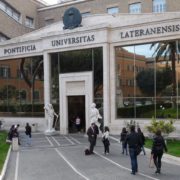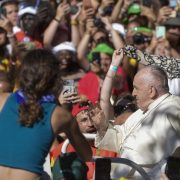Once upon a time, when plots were plots, and combat was with cloaks and daggers, it was poison in the soup or in the herbal tea before bed. Or it was a strike of a stiletto in the corridors. Or it was an insurrection of the populace and he, in his white robe, was driven out to Avignon or to a mountain hermit monastery, like Dante’s 13th century Celeste V, the Pope of the gran rifiuto, the grand abdication, the only one in the millennia of history of the papacy, until that of Benedict XVI, five years ago.
Those were the coups of the Vatican, then the almost almighty Pontiff State. Now coups are choreographed, scripted, and coordinated like Hollywood movies, with press releases in multiple languages. O tempora, o mores; it is the custom of the time, after all.
Presently the plot unravelling is the following, which began some years ago, when Benedict had not yet resigned.
Many of the secrets of his holy chambers spilled out. The butler was found guilty, but perhaps he was not the only culprit. Pope Benedict resigned, and another Pope, Francis, was elected, although his name took the Curia and many powerful people by surprise.
Then a succession of events unfolded. A cardinal broke the vow of secrecy in a talk with the Pope. Another cardinal was forced to resign over a sex scandal. A nuncio, the voice and mind of the Pope abroad, divulged secrets of half truths and asked for the Pope’s resignation; liberal writers accused the Catholic Church of being a crime syndicate.
You can fill in the names you wish, like in a fanciful and harrowing spy story. Or you can pick the names from reality. Welcome to the new conspiracy theory of the 21st century, resembling so much those of the Middle Ages.
Just to focus on the most recent events, watching the news, it looks like a Hollywood movie about some corporate scandal where the villain, feeling wronged, asks for the CEO to step down, because «he also knew». It may sound disrespectfully insane, speaking of the 2,000-year-old Holy Mother Church this way, but this is how it sounds in the words of conservative archbishop Carlo Maria Viganò who is now claiming that Pope Francis knew and covered up the sex scandal that is breaking asunder the Catholic Church worldwide.
The Vatican’s former nuncio to America, Viganò, in a long letter published Sunday in some of the major American conservative outlets antagonistic to Francis, brought the burning issue of child molestation in the Catholic Church to a whole new level. Viganò for the first time since the matter exploded some 15 years ago, openly and directly implicated the Pope in the scandal, claiming that he knew of Cardinal Theodore McCarrick’s trespasses and crimes with children and seminarians. In doing so, he provided the missing proof that these were not isolated incidents but that the universal Church, up to its leader, the Pope, was involved.
The claim came out during the very hours when Francis was visiting Ireland, where he begged «the Lord’s forgiveness» for the scandals while at a shrine.
As the Pope was praying for forgiveness, Viganò called for his resignation: «In this extremely dramatic moment for the universal Church, he must acknowledge his mistakes and, in keeping with the proclaimed principle of zero tolerance, Pope Francis must be the first to set a good example to Cardinals and Bishops who covered up McCarrick’s abuses and resign along with all of them».
Viganò alleges he had personally reported McCarrick to Pope Francis and that for a long time Francis did nothing about it. Viganò has also been somehow implicated in a previous Vatican scandal that allegedly ultimately led to the resignation of Pope Benedict XVI.
All this drama – the timing, the press coverage, the publicity – makes it look as if the Catholic Church has become American like never in its past history. The United States in fact dominates the agenda of the Church in an unprecedented way.
This is not because the USA is the current superpower, nor is it because of the amount of donations from the US Catholics to fellow believers all over the world, but because the issues arising from the Catholic Church in America have become the main discourse of the universal Church.
The obvious example is the scandal over sexual abuse of children, but it is also linked to the controversies about Amoris lætitia, the work by which the Pope tried to change the Church’s attitude towards marriage and sacraments.
These subject has been dictating the agenda of the Church for the past several years, and because of the nature of the wound to the body of the Church and the deep mistrust it has sown, it will take many more years, possibly decades, to heal and get over.
Yet, while the US has such an immense influence on the Catholic world, there seems to be a growing distance between Rome and the US. Massimo Faggioli argued recently that Rome seems unable to communicate effectively with the US, and there is an increasing cultural difference between Rome and the US.
This may be because, as a US Catholic told us, «We Americans used to obey whatever Rome said and never speak back. Now we also want a voice». This seems to be the background for David Gibson’s analysis.
But is Pope Francis interested in intervening as Gibson suggests? Pope Francis seeks to convert people, not dismiss them. He wants lay people involved in the Church, not a new clericalism replacing the old clericalism.
We can look at his reform of the Curia for an example of this. Pope Francis didn’t move with a plan or a blueprint. He changed things and shuffled positions, but pushed by meditation and prayer, always thinking that he has to align the Church with Jesus and then he will change the Church, as Antonio Spadaro argued in a recent conference in Rome.
But all of this brings to the fore several sets of problems. If the US and its voice and concerns dominate Rome, but Rome can’t communicate with the US, this creates a very unbalanced situation that could turn the whole Church upside down.
The other issue is wider. This Pope is making inroads in Asia for the first time ever, and the Catholic Church is expanding its footprint in Africa. But these places have little or no interest in controversies of child abuse or sexual ethics. How can these different concerns live together? Will they not clash?
Then embedded in this, there are other sets of problems. Child abuse and sexual ethics are burning issues for Catholics and Protestants in America and Europe. They move politics, and rekindle old frictions between Catholics and Protestants. If the Pope manages them badly, many Catholics will abandon their faith. If he does well, conversely, he may open a road for a great Christian reconciliation.
But in other places, the competition is with Muslims, or Buddhists, or Hindus, or oppressive regimes. That is, while the US wants a voice in Rome and brings there a legitimate, very important agenda, this agenda is removed from what the Church is facing in other parts of the world. Yet it will have a very important impact in those places. Sensibilities about Asia and Africa are also very different in Rome and in America.
To keep the Church united, the point is not only the need to address sexual scandals, but to move away from a Church perhaps too absorbed with the lower parts of the body and toward a Church reaching out to non-Catholics and the poor. It is about the agenda, some in the Church and around the Church don’t like a Pope too concerned about immigrants or peace, they rather have him concentrated on sex.
And it is about power. The old power positions are broken. When a modest priest from Laos is chosen as a cardinal, thus with the privileges to elect the future Pope, rather than the mighty bishop of large, rich city, the old balance will be thrown off. The coup, with all its new glitter and bells and twinkles and shine, is about this. But it is too late; the Church has already moved somewhere else, most of the cardinals of a future conclave have already been chosen by Francis, so that after him his successor will be Francis II.
And the coup is illogical. You don’t like the Pope? Do like archbishop Lefebvre in the 1970s, or many before him, establish your own holy order and your own priests and part ways with Rome.
But to ask for the Pope’s resignation with a newspaper article?! It has never happened in 2000 years – you can’t be conservative and innovate on tradition so much at the same time. It can’t be both; it doesn’t work. If you insist on acting against the Pope, get your poison, or your stiletto… and get in line.





